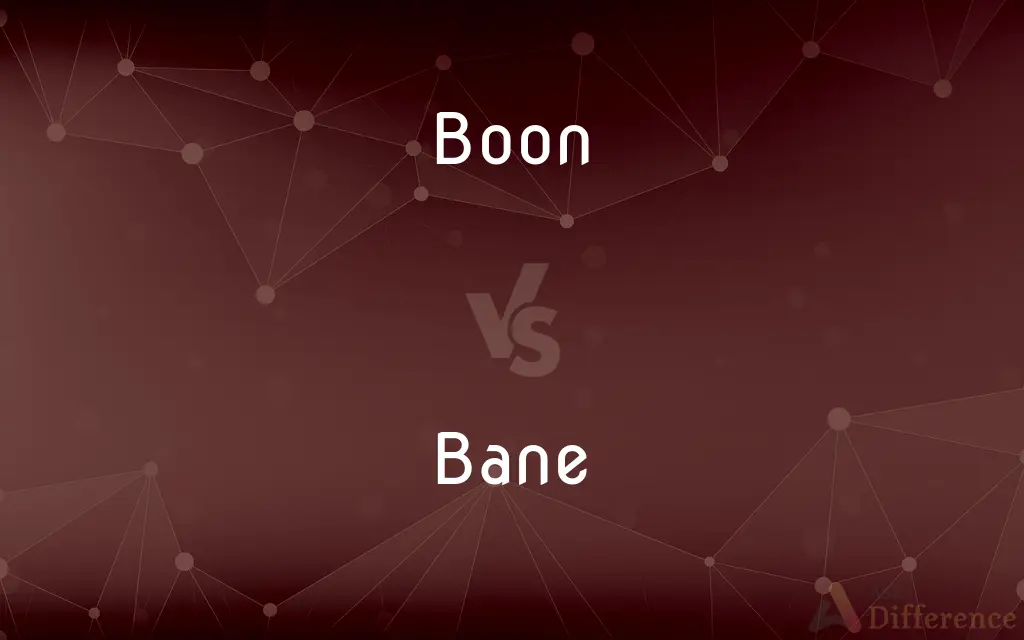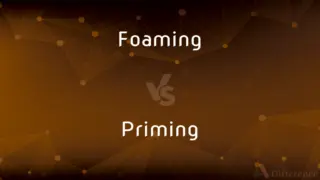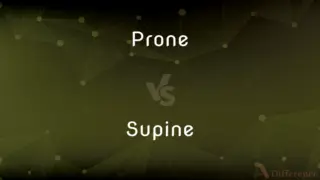Boon vs. Bane — What's the Difference?
Edited by Tayyaba Rehman — By Urooj Arif — Updated on March 18, 2024
Boon is a benefit or blessing, often enhancing life or experiences, while bane refers to a cause of great distress or annoyance.

Difference Between Boon and Bane
Table of Contents
ADVERTISEMENT
Key Differences
Boon implies something beneficial, a positive force that brings advantages or aids, whereas bane signifies a source of harm or ruin, often representing challenges or obstacles. Boons are often sought after for their ability to improve situations or outcomes, enhancing well-being or success. On the other hand, banes are typically avoided, as they can lead to difficulties or adverse conditions.
In historical contexts, 'boon' was used to describe gifts or favors granted by someone in power, illustrating its positive connotations, while 'bane' was often associated with poisons or things that led to death, highlighting its negative aspects.
Boons are frequently associated with growth, prosperity, and positive outcomes in personal, societal, or environmental contexts. Banes, conversely, are linked with destruction, setbacks, and negative impacts, often posing significant challenges.
The term 'boon' can be used in various contexts, from personal to technological advancements, indicating something that enhances life or efficiency. Bane, however, is used to describe elements that hinder progress, cause distress, or pose significant challenges, from personal habits to technological issues. Boons and banes both play significant roles in narratives and discussions, often representing the dual aspects of circumstances or innovations, with boons highlighting the positive and banes the negative implications.
Comparison Chart
Definition
A benefit or blessing
A source of harm or annoyance
ADVERTISEMENT
Connotation
Positive, advantageous
Negative, detrimental
Usage in context
Enhancements, improvements
Obstacles, challenges
Historical usage
Gifts, favors
Poisons, causes of death
Impact on progress
Facilitates growth and success
Hinders or complicates progress
Compare with Definitions
Boon
A blessing or advantage.
The new park is a boon for the local community.
Bane
A person or thing that ruins or spoils.
Invasive species can be the bane of local ecosystems.
Boon
An asset or valuable quality.
His ability to work under pressure was a boon to the team.
Bane
A source of persistent annoyance or exasperation.
Endless paperwork is the bane of my job.
Boon
A timely benefit or form of help.
The grant was a boon to the struggling artist.
Bane
Something, especially poison, that causes death.
The poison was the bane of the king.
Boon
Something that is asked or granted as a benefit.
The favorable weather was a boon for the farmers.
Bane
A cause of great distress or annoyance.
Traffic jams are the bane of my existence.
Boon
A favorable circumstance or occasion.
The holiday season was a boon for retailers.
Bane
Something that causes harm or destruction.
The drought was the bane of the farmers that year.
Boon
A thing that is helpful or beneficial
The route will be a boon to many travellers
Bane
A cause of great distress or annoyance
The telephone was the bane of my life
Boon
A favour or request.
Bane
Something, especially poison, which causes death.
Boon
Something that provides a benefit or an advantage
A brisk breeze is a boon to sailors.
Bane
A cause of harm, ruin, or death
"Obedience, / Bane of all genius, virtue, freedom, truth, / Makes slaves of men" (Percy Bysshe Shelley).
Boon
Convivial; jolly
A boon companion to all.
Bane
A source of persistent annoyance or exasperation
"The spellings of foreign names are often the bane of busy copy editors" (Norm Goldstein).
Boon
(Archaic) Favorable.
Bane
Fatal injury or ruin
"Hath some fond lover tic'd thee to thy bane?" (George Herbert).
Boon
(obsolete) A prayer; petition.
Bane
A deadly poison.
Boon
(archaic) That which is asked or granted as a benefit or favor; a gift or benefaction.
Bane
A cause of misery or death.
The bane of one's existence
Boon
A good thing; a blessing or benefit; a thing to be thankful for.
Finding the dry cave was a boon to the weary travellers.
Anaesthetics are a great boon to modern surgery.
Bane
(dated) Poison, especially any of several poisonous plants.
Boon
An unpaid service due by a tenant to his lord.
Bane
(obsolete) A killer, murderer, slayer.
Boon
The woody portion of flax, separated from the fiber as refuse matter by retting, braking, and scutching.
Bane
(obsolete) Destruction; death.
Boon
(obsolete) Good; prosperous.
Bane
A disease of sheep.
Boon
(archaic) Kind; bountiful; benign.
Bane
(transitive) To kill, especially by poison; to be the poison of.
Boon
(now only in boon companion) gay; merry; jovial; convivial.
Bane
(transitive) To be the bane of.
Boon
A prayer or petition.
For which to God he made so many an idle boon.
Bane
That which destroys life, esp. poison of a deadly quality.
Boon
That which is asked or granted as a benefit or favor; a gift; a benefaction; a grant; a present.
Every good gift and every perfect boon is from above.
Bane
Destruction; death.
The cup of deception spiced and tempered to their bane.
Boon
The woody portion flax, which is separated from the fiber as refuse matter by retting, braking, and scutching.
Bane
Any cause of ruin, or lasting injury; harm; woe.
Money, thou bane of bliss, and source of woe.
Boon
Good; prosperous; as, boon voyage.
Bane
A disease in sheep, commonly termed the rot.
Boon
Kind; bountiful; benign.
Which . . . Nature boonPoured forth profuse on hill, and dale, and plain.
Bane
To be the bane of; to ruin.
Boon
Gay; merry; jovial; convivial.
A boon companion, loving his bottle.
Bane
Something causes misery or death;
The bane of my life
Boon
A desirable state;
Enjoy the blessings of peace
A spanking breeze is a boon to sailors
Boon
Very close and convivial;
Boon companions
Common Curiosities
How can something be considered a bane?
Something is considered a bane if it causes distress, annoyance, or harm.
What is a boon?
A boon is something that is beneficial, helpful, or advantageous.
Can technology be both a boon and a bane?
Yes, technology can be a boon in terms of convenience and efficiency, but a bane when it leads to issues like privacy invasion.
Can a bane be mitigated or turned into a boon?
With the right measures, innovation, or changes in perspective, a bane can sometimes be mitigated or even turned into a boon.
Can the same thing be a boon to one person and a bane to another?
Absolutely, depending on individual circumstances or perspectives, something can be a boon to one and a bane to another.
How do boons impact society?
Boons can lead to societal improvements, enhancements in quality of life, and overall progress.
Is a boon always positive?
Yes, by definition, a boon is always something positive or advantageous.
Are boons always tangible?
No, boons can also be intangible, such as peace, happiness, or knowledge.
How can one identify if something is a boon or a bane?
Assessing the overall impact, benefits, and drawbacks can help determine if something is more of a boon or a bane.
What role does context play in determining a boon or a bane?
Context is crucial; economic, social, and personal circumstances can all influence whether something is a boon or a bane.
Is a bane always avoidable?
Not always; some banes, like natural disasters, cannot be avoided, but their impact can be managed or reduced.
What are some examples of banes in the environment?
Pollution, climate change, and deforestation can be considered banes in the environment.
Can the definition of a boon or a bane change over time?
Yes, as society and technology evolve, perceptions of what constitutes a boon or a bane can also change.
Can something be a bane due to misuse, even if it's generally a boon?
Yes, misuse or overuse can turn something generally beneficial into a bane, such as medication or technology.
How does culture influence what is considered a boon or a bane?
Cultural values, beliefs, and priorities can greatly influence the perception of what is beneficial (boon) or harmful (bane).
Share Your Discovery

Previous Comparison
Foaming vs. Priming
Next Comparison
Prone vs. SupineAuthor Spotlight
Written by
Urooj ArifUrooj is a skilled content writer at Ask Difference, known for her exceptional ability to simplify complex topics into engaging and informative content. With a passion for research and a flair for clear, concise writing, she consistently delivers articles that resonate with our diverse audience.
Edited by
Tayyaba RehmanTayyaba Rehman is a distinguished writer, currently serving as a primary contributor to askdifference.com. As a researcher in semantics and etymology, Tayyaba's passion for the complexity of languages and their distinctions has found a perfect home on the platform. Tayyaba delves into the intricacies of language, distinguishing between commonly confused words and phrases, thereby providing clarity for readers worldwide.














































